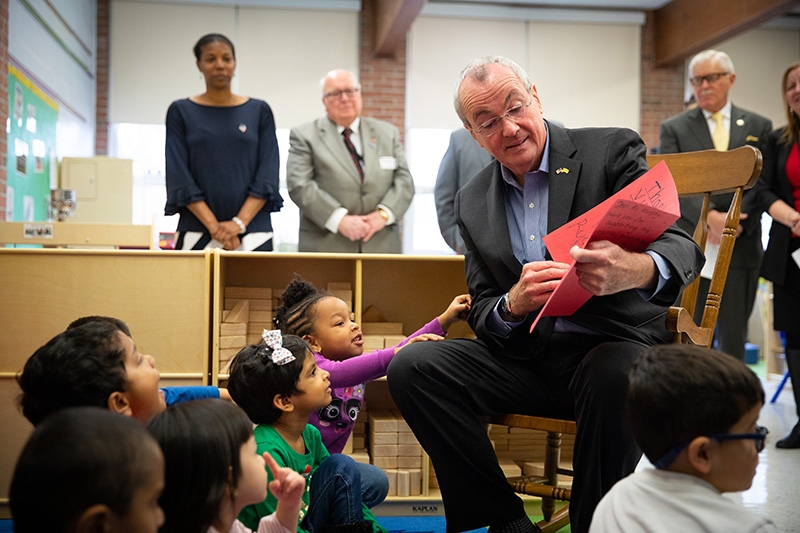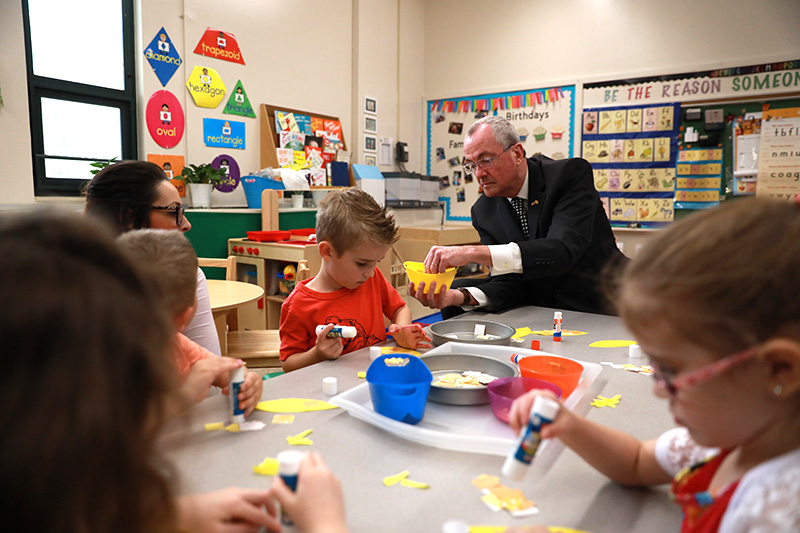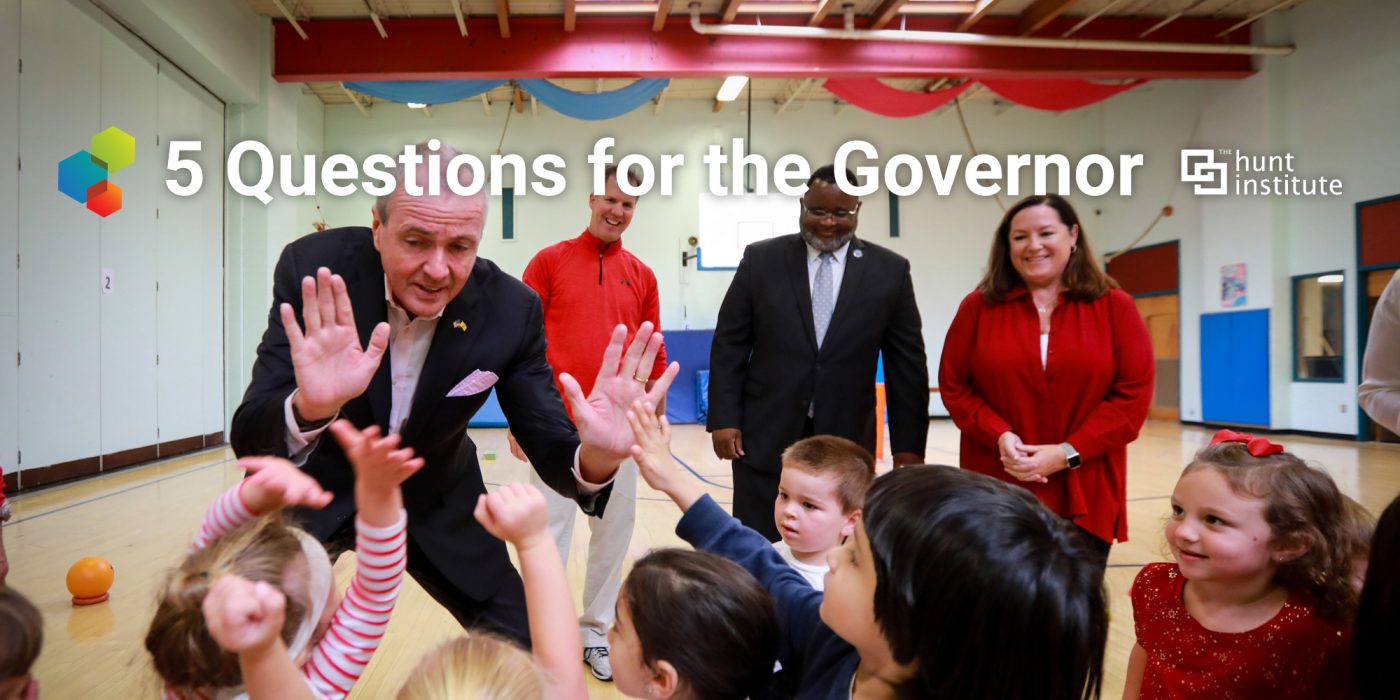Where do you go for the top news in Early Learning at the state level? Check out “5 Questions for the Governor,” where we’ll explore the top Early Learning challenges and successes in states across the nation. We’re thrilled to partner with The Hunt Institute on this series. Read them all.
1. A mission of your administration is to build a stronger and fairer New Jersey that works for every family. How do you see early childhood education and care supporting this result?
Research has long shown the positive impact of high-quality early education on long-term development, growth and achievement. And, the earlier children are first engaged, the greater the benefits become.
 A recent study released by NIEER found that New Jersey’s high-quality Abbott preschool programs had demonstrable positive effects on students through 10th grade. The benefits of those early educational experiences not only help young children, but continue into adolescence, helping us make significant strides in ending gaps in academic achievement and proficiency.
A recent study released by NIEER found that New Jersey’s high-quality Abbott preschool programs had demonstrable positive effects on students through 10th grade. The benefits of those early educational experiences not only help young children, but continue into adolescence, helping us make significant strides in ending gaps in academic achievement and proficiency.
Further, the pandemic has brought the necessity of reliable and high-quality child care to the forefront of our state—and nation’s—attention. By ensuring accessible and affordable child care, we can support sustainable economic growth for families.
2. Your office has proposed and enacted significant increases in early childhood funding, helping to make early childhood services accessible to thousands of additional children. What have been the keys to your success?
First and foremost, a close focus on ensuring equity and providing programs to underserved communities has been a key strategy and guiding principle of our Administration’s expansion of pre-K programs.
At the same time, our administration has strived to build on our success, year after year, learning as we grow and annually increasing the number of new pre-K programs that have been able to open their doors. This targeted and phased-in approach has ensured that new programs have the resources they need while we assess the need for future expansion. In three years, the state has successfully provided over 6,600 new seats for three and four-year-olds in over 100 districts.
3. You made several references to New Jersey’s youngest citizens in your State of the State address, including points on ensuring children have access to academic and social-emotional supports and affordable child care. How do you see these priorities complement your overall agenda for New Jersey?
Building a stronger and fairer New Jersey starts in childhood, by ensuring every child has access to the tools needed to achieve success – academically, socially, emotionally and economically.
By creating equity in access to safe and supportive environments that promote the development of resilience, as well as access to learning supports and valuable time with peers and other adults, we are setting every child—and our state—on a path to success.
4. New Jersey has successfully reduced child care subsidy co-payments for families by 50 percent, increased subsidy payments to providers and invested over $100 million in new resources to support child care. Why is child care critical to the prosperity of New Jersey?
Before COVID, our Administration was already investing heavily in our child care sector to improve accessibility and affordability. During COVID, it became even more obvious how essential this industry is to the health of our economy. We therefore invested an additional $300 million to both stabilize the industry and help families access care despite increased needs.
 For any family with working parents, high quality, accessible and affordable child care not only has significant positive impacts on the children who attend, it is necessary to help parents get to work.
For any family with working parents, high quality, accessible and affordable child care not only has significant positive impacts on the children who attend, it is necessary to help parents get to work.
High quality child care is also a vital opportunity to support children’s development outside of the pre-K to 12 school system, supporting their mental health, academic achievement and social development as early as possible.
We also know the particular importance of accessible, affordable and reliable child care for single parent families, especially for working moms, who need to be able to provide for their families and have the peace of mind of knowing their children are safe.
5. Looking forward to a post-pandemic future, what is your greatest hope for the children and families of New Jersey?
My greatest hope is that we continue on this path of building a stronger and fairer New Jersey for everyone.
The pandemic has laid bare so many long-standing inequities across our country. I’m proud of the investments we have made in New Jersey to not only address the immediate needs from COVID, but also to ensure we are continuing our investments in long-term solutions that will continue to improve the lives of New Jerseyans from birth onward.
New Jersey has made so many great strides toward being the best place to have and raise a family – for every family. From creating a universal home visiting program, to improving access to affordable child care, to consistently expanding access to quality pre-k, to having the number one rated public schools, to creating opportunities for free community college, to increasing access to affordable and reliable health care including mental and behavioral health care, to improving transportation and affordable housing…the list of unparalleled benefits to living and raising a family in New Jersey truly goes on and on.
Our goal is to ensure every family has access to those benefits.
Photographs were taken pre-pandemic.



